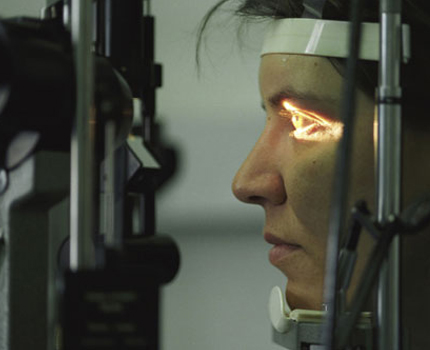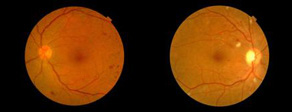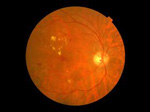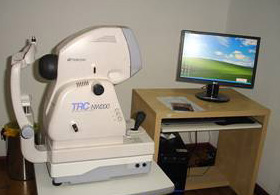 Are you Diabetic? Get your eyes screened for Diabetic eye disease today?
Are you Diabetic? Get your eyes screened for Diabetic eye disease today?
One of the major health related issues today is Diabetes Mellitus. It is said to be a modern pandemic and has affected 250 million cases globally. More than a million UAE residents suffer from diabetes or are pre-diabetic. According to recent estimates, the majority of cases would be found in Middle East and Asia by the year 2025.
Diabetes is a metabolic disease in which the body is not able to regulate the amount of sugar in body. It can affect the patient’s kidneys, eyes, nerves, immunity and the heart.
Diabetic eye disease refers to a group of eye problems that people with diabetes may face as a complication of diabetes. Some of them can cause severe vision loss or even blindness.
Why is it important to screen for Diabetic Retinopathy
-
Untreated Diabetic Retinopathy is the leading cause of blindness
-
Diabetic Retinopathy does not cause pain
-
Diabetic Retinopathy does not cause blurred vision till the late stages
-
Laser treatment is a effective treatment for Diabetic Retinopathy
-
If Diabetic Retinopathy is detected late, the risk of complications are high
The primary purpose of evaluating and managing diabetic retinopathy is to prevent, retard, or reverse visual loss, there by maintaining or improving vision-related quality of life
Are you at Risk of Diabetic Retinopathy?
You are at risk if
-
If you have Diabetes for a long time
-
If your sugar levels are not controlled
-
If you are Hypertensive
-
If You are obese
-
If your lipid levels are high
-
If you smoke
-
If you have kidney problems due to Diabetes
How does Diabetic Retinopathy affect Vision?
-
Blood vessels can leak fluid into the centre of macula where the most sharp image is formed, this is known as macular oedema
-
New Vessels can form in the retina which bleed easily causing haemorrhage in the eye.
Digital Fundus Photography is an sensitive and effective screening tool for screening and monitoring Diabetic Retinopathy
You may not drive after your eyes are dilated for retinal examination
How can Diabetes effect your eye?
Eye involvement in Diabetes Mellitus can result in predisposition of the patient to
- Recurrent eyelid infections
- Sudden onset squint and double vision
- Corneal ulcer
- Uveitis – Inflammation in the eye
- Cataract – Clouding of the eye’s lens. Cataract develops at an earlier age in people with diabetes
- Glaucoma – Disease affecting the field of vision. A person with diabetes is nearly twice as likely to get glaucoma
- Diabetic Retinopathy – Damage to the retinal blood vessels leads to changes which can eventually cause blindness if not treated at right time
The most important caused of visual loss in diabetes are Diabetic Retinopathy, Cataract and Glaucoma
What is Retina and why is it important?
 Retina refers to a light sensitive tissue at the back of the eye. It is important to have a healthy retina to have a good vision. Any disease affecting the retina can have effect on the vision.
Retina refers to a light sensitive tissue at the back of the eye. It is important to have a healthy retina to have a good vision. Any disease affecting the retina can have effect on the vision.
Picture 1: Normal Retina
What is Diabetic Retinopathy?
Diabetic Retinopathy refers to the series of retinal changes that occur in nearly all patients with diabetes mellitus. In people with diabetic retinopathy, retinal blood vessels leak fluid. In advanced stages abnormal new blood vessels grow on the surface of the retina which can suddenly break and cause bleeding in the eye and affect vision.
Picture 2: Early Diabetic Retinopathy
 Picture 3: Diabetic Maculopathy
Picture 3: Diabetic Maculopathy
(Centre of Retina affected)
 Picture 4: Advanced
Picture 4: Advanced
Diabetic Retinopathy
with Bleeding
Will I notice change in my vision if I have Diabetic Retinopathy?
In the initial stages the diabetic retinopathy will not have any effect on the vision; however as the retinopathy gets worse it will cause vision loss especially if the centre of retina is affected.
Is Diabetic Retinopathy painful?
No, since retina does not have any pain fibres, the diabetic retinopathy does not cause any pain. This is why screening of Diabetic Retinopathy is important. However pain may develop if complications like glaucoma develop in the late stages.
What is screening for Diabetic Retinopathy?
Screening means examining your eyes regularly to detect changes in eyes brought about by Diabetes.
How frequently do I need to have an eye examination?
Recommended Eye Screening Schedule for Diabetic Retinopathy
| Diabetes Type | Recommended Time of First Examination | Recommended Follow-up* |
| Type 1 | 3-5 years after diagnosis | Yearly |
| Type 2 | At time of diagnosis | Yearly |
| Prior to pregnancy (type 1 or type 2) |
Prior to conception and early in the first trimester |
No retinopathy to mild or moderate Diabetic Retinopathy : every 3-12 months
Severe Proliferative Diabetic Retinopathy or worse: every 1-3 months |
* Abnormal findings may warrant a more frequent examination
What happens during an eye examination?
- The doctor will make comprehensive eye assessment including check up of your vision, intraocular pressure and retinal examination.
- He may instill some drops to dilate your pupil to have a good look at your retina.
- He might take some photographs of your retina and store it in the computer. He can use these images to compare the retinopathy in subsequent follow up visits.
- You may experience little blurring of vision for one day. This is due to the drops that were instilled for the dilation of your pupil. Due to this it will be difficult for you to drive back home. so please bring some one to drive you back.
- Depending upon your diabetic retinopathy status, the doctor will advise you regarding when you have to come for a follow up visit.

Digital Fundus Camera with computer attachment
Do the Eye Drops used have any side effects?
The drops used for the eye examinations are generally safe. If you are hypertensive or have known allergies to specific drugs, do inform the doctor. The drops may make near things blurred which will last for 6-48 hours depending upon the type of drops used. The eye care physician will inform you about it. It is not advisable to drive after you have your pupils dilated.
If I am diagnosed as having Diabetic Retinopathy, What’s next?
If you are diagnosed as having Diabetic Retinopathy, doctor may advice you for the next visit or he may advice you to undergo Fluorescein Angiography in which a dye is injected into blood and photographs are taken of the retina. This would help him deciding the future course of management.
What are the treatment options of Diabetic Retinopathy?
Strict Control of Blood Sugar level is very important in Diabetic Retinopathy. Depending upon the stage of Diabetic Retinopathy, the doctor would advice you regarding further management options including laser treatment of the retina or injecting some medicines into your eye. In advanced cases of Diabetic Retinopathy when bleeding occurs inside the eye, you may require eye surgery. You will need periodic follow ups with your eye doctor.
Specialist and Lecturer
Ophthalmology Services
GMC Hospital, Ajman

